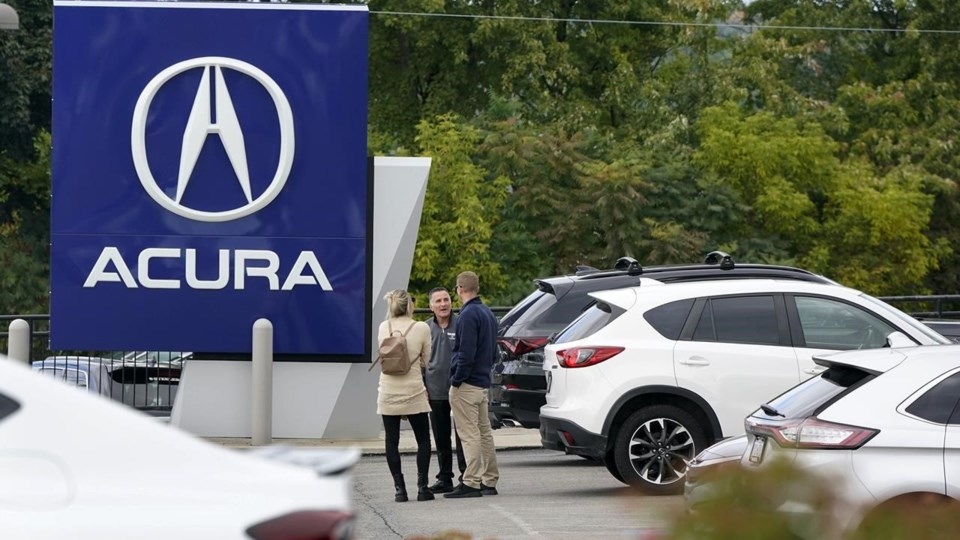DETROIT (AP) — U.S. new vehicle sales fell slightly in the third quarter, even though some automakers reported improvement in September. But there are warning signs consumers' appetite for expensive new cars, trucks and SUVs may be waning.
Edmunds.com said Monday that sales fell 0.9% from July through September, with most automakers reporting declines. General Motors was a notable exception, logging a big increase.
Many companies, including GM, said sales rose in September as shortages of computer chips and other parts started to ease and auto factories were able to produce more, increasing vehicle supplies. But analysts said any monthly gain may be short lived due to high prices and rising interest rates.
“With increasing interest rates, affordability is being tested,” Zack Krelle, an industry analyst at TrueCar. “We're seeing consumers faced with the reality that to afford the same vehicle at the same monthly payment as last year, they are forced to increase their down payment, which is creating affordability challenges.”
Last month, new auto prices averaged $45,622, the fourth-highest monthly price on record, according to J.D. Power. In addition, average auto loan interest rates hit 5.7% between July and September, up from 4.3% a year ago, with terms stretched to average over 70 months, Edmunds said.
Still, General Motors managed to lead the industry for the quarter, selling more than 555,000 vehicles, a 24% increase over last year. The company said it saw improved semiconductor supplies, more stable production and increased inventory on dealer lots. The number of GM vehicles in transit or on dealer lots rose to 359,292 last quarter, up more than 111,000 from the second quarter, GM said.
The automaker said sales of its Bolt electric car and utility vehicles more than tripled to almost 15,000 combined, so it will increase production for global distribution to 44,000 this year. The company couldn't sell Bolts much of last year due to a recall for battery fires.
Honda, which was hit hard during the summer as parts shortages cut shipments to dealers, said September was its best sales month since May as it overcame transportation issues. Still, sales were down 17% in September from a year ago, and off 36% for the quarter.
Mamadou Diallo, vice president of sales, said in a statement that Honda expects increased production in the fourth quarter as it introduces new models. “The pipeline is getting stronger,” he said.
Toyota sold 7.1% fewer vehicles than in last year's third quarter, and Stellantis, formerly Fiat Chrysler, reported a 6% decline, while Nissan was off nearly 23%. Hyundai reported a sales increase for the quarter, 3.3%, as did Volkswagen, up 12%.
For much of the year, sales have been down, but automakers have been getting sticker price or above for scarce vehicles from consumers who wanted or needed new wheels. As a result, automakers and dealers made big profits.
Ivan Drury, director of insights for Edmunds.com., said there has been a tremendous amount of “deferred demand” for new vehicles this year. But he cautioned that macroeconomic trends are starting to worsen as inflation stretches monthly budgets and the Federal Reserve raises interest rates to counteract it. Drury says housing values are expected to decline soon, reducing personal wealth as auto loan rates increase monthly payments.
“I think it's finally taking a turn for the worse, the uneasiness with interest rates, with inflation," Drury said.
Even with high trade-in values, the rates are making monthly payments prohibitively high, he said, adding that if unemployment starts to rise, auto sales could start to drop.
“The potential pool of consumers who are flush with cash or don't care what they pay, that pool is going to shrink rapidly once these other factors take effect," he said.
During the summer, people were paying an average of $700 over sticker price to buy vehicles, Drury said. But that recently has dropped to the upper $200 range, a sign of the market cooling, he said.
Most automakers reported sales on Monday. Ford is to release its figures on Tuesday. Edmunds' figures include estimates for both companies.
Telsa reported that its global sales during the quarter rose 35% compared to the second quarter as the company’s huge factory in China got past supply chain issues and pandemic restrictions. The electric vehicle and solar panel company said Sunday it sold 343,830 cars and SUVs in the third quarter compared with 254,695 deliveries made from April through June. But its sales fell short of analyst expectations.
Tesla does not break out sales by country or region.
Tom Krisher, The Associated Press



